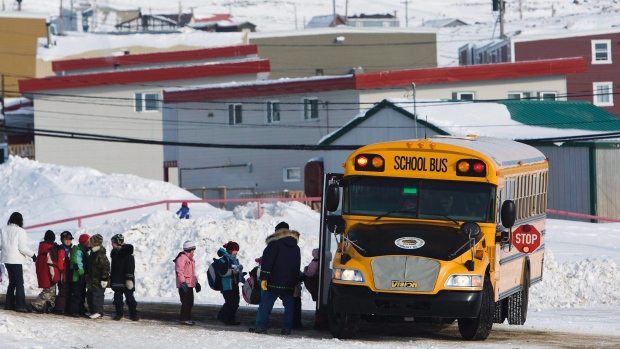Auditor General: Nunavut, Canada won’t meet bilingual education goals

When a made-in-Nunavut Education Act was passed by the legislative assembly in Canada’s eastern Arctic territory of Nunavut in 2008, there were cheers in the hallways.
Now, five years later, a report from Canada’s Auditor General says Nunavut is falling behind on its schedule to implement the act.
The Education Act promised bilingual education for all students by the 2019-2020 school year. It also promised Inuit culture in all aspects of schooling, a strong role for district education authorities and additional support to help students succeed.
The promise of bilingual education stemmed from a strong desire to protect and promote the Inuit language, but also from a 2006 report from Justice Thomas R. Berger, who wrote that the abrupt switch from English to Inuktitut around Grades 3 or 4 was limiting students’ comprehension in either language, and contributing to Nunavut’s high dropout rates.
Ronnie Campbell is the assistant auditor general. He says that by now, all schools should be offering bilingual education from Kindergarten to Grade 4. Of the five elementary schools they studied in the 2011-2012 school year, only one met that goal.
“One of the big problems was a lack of bilingual educators,” Campbell says.
The audit found the department did not have a clear idea of how many bilingual teachers would be required to meet the goal. It also found the department was not doing a good job providing training — in assessment or classroom instruction — to the people it was hiring as language specialists, in place of teachers, and that this was having a negative impact on education.
Classroom resources were another issue. The audit found the department was “extremely slow to provide resources” in both languages, and recommends changes to the way the department produces materials. The audit recommends the department consider adapting more classroom materials from outside of Nunavut.
Social issues ‘hammering’ education
The report focused on the implementation of the Education Act in six key areas: attendance, assessment, bilingual education, inclusive education, curriculum and parental involvement. The report did not assess the quality of education overall.
However, it found that even when it comes to implementing the Education Act, factors outside of the education system are “hammering” the territory’s education system. Those include the growing trend of parents speaking English, and not Inuktitut, in the home and a lack of staff in the education department. They also include many of Nunavut’s well-known social ills, such as overcrowding, food security, poor health, substance abuse, teen pregnancy and the legacy of residential schools.
These problems show up in attendance records, which show students come to school about 80 per cent of the time. In fact, some documents the auditors examined showed that students attended class less than 50 per cent of the time, with attendance dropping as low as 27 per cent.
The audit found that school efforts to improve attendance and parental engagement were haphazard, and that effective methods were not being shared with other schools.
‘Continuous progress’ not working
While the report didn’t specifically address the issue of social promotion — the practice of passing kids even when they haven’t mastered the skills of their grade level — the issue does come up.
The audit notes that the Grade 12 students it examined achieved classroom grades that were, on average, 30 per cent higher than the grade obtained on the standardized Alberta exam. By comparison, students in Whitehorse, Yukon had class marks that were about 4 per cent higher than their standardized test mark.
The audit found the department had done no analysis to explain the discrepancy.
The department has repeatedly said it offers “continuous progress” so that students who are at different levels can move up grades. It claims that teachers offer “differentiated instruction” in the classroom to meet the needs of all students. That is, to teach to different levels at the same time.
The auditor general found that was difficult to do, when so many kids missed classes frequently. It recommends “the department provide mandatory training on differentiated instruction and related ongoing assessment to all Nunavut teachers and student support assistants.”
Department accepts the report
The positive news in the report is that the department of education has already accepted the report and its recommendations and has made several commitments to re-prioritize and reassess the way it does its work.
That means that Nunavut’s new Education Minister, Paul Quassa, will have his work cut out for him.
The audit also noted that the department has made good progress developing regulations and offering training in schools and to district education authorities.
In fact, the report found that senior staff started with a good plan, and senior officials reported they were given enough money to carry it out. However, the audit found the department greatly underestimated the magnitude of the work.
Related Links:
VIDEO: Losing their Words, Eye on the Arctic



